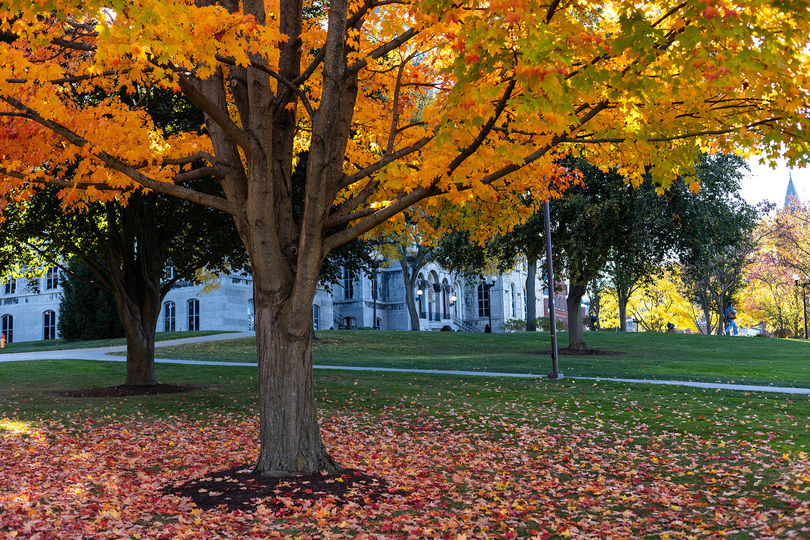Guest Column: J-1 visas must be more accessible for cross-cultural experience

Our columnist argues we must recognize the cross-cultural benefits of J-1 visas beyond the work opportunities they allow. He writes the application logistics for people returning for work, like camp counselors, should be simpler. Tara Deluca | Staff Photographer
Get the latest Syracuse news delivered right to your inbox.
Subscribe to our newsletter here.
Something interesting happens behind the scenes of your average American sleepaway camp every summer: People from across the world come to the United States to work as camp counselors, but before they even step on the plane, they must first face a series of logistical obstacles.
Around 30,000 people arrive in New York annually under the J-1 visa, and roughly 300,000 nationally. These include camp counselors, researchers, teachers, au pairs and more. But last December, 37 countries were removed from the J-1 visa Skills List. This means that visa-holders from these nations must remain in their home country for two years before they can reapply for certain U.S. visas, limiting participation on a global scale.
Working with international staff using J-1 visas for the last 10 years as a camp counselor, I’ve heard about the difficulties in obtaining a visa to come to the U.S., specifically from a fellow counselor. They expressed to me they didn’t want to return due to the burden of re-applying for a visa.
Whether it be yearly mandated background checks, routine bureaucratic paperwork or intense in-person questioning by a United States Citizenship and Immigration Services officer at their embassies, there are almost too many roadblocks to pursuing what is otherwise a great opportunity, especially for returners.
J-1 visas allow for a cross-cultural bonding that is rarely found anywhere else. As applications open up and letters of agreement are released for incoming people with visas, we should recognize these benefits better by alleviating the stress of application logistics for returning counselors.
When looking back on the experience, it's clear it was all worth it, but that doesn't justify the excruciating process we could easily fix on re-applying every single year.Spencer Perlmutter, Columnist
About a week and a half before camp starts, different countries have a dedicated flight to JFK Airport. New international staff begin building relationships in the airport as they find out who shares their bunk. Once they arrive, orientation throws them into the world of learning to be a camp counselor.
In many camps, former campers – mainly Americans – return as staff. They know what it’s like to arrive on opening day, nervous and unsure. Now, they have to be able to lead their own bunks.
When international staff join them, managing the campers becomes so much easier. The American staff know the camp’s traditions while the international staff bring fresh enthusiasm, encouragement, ideas and questions. Together, they both bond over helping the kids.
Rylan Rockfeld, a sophomore at SU and also an American counselor, has been involved with Camp Silver Lake. “J-1 visas add to the creative element of camp and truly help benefit the kids,” he told me.
Whether campers are playing board games, creating art projects or playing a card game, being with an international counselor helps campers adapt to new cultures, ideas and opens them up to new experiences.
International staff offer a variety of skills and staff numbers that improve daily programming through strength in outdoor skills, sports, arts and other activities.
When a camper hears an Australian accent explaining a game or asks a counselor from the United Kingdom about university life in Britain, they gain a tangible connection to life outside of their country. I’ve heard campers pick up slang words, ask questions about wildlife and even compare school systems. They become more aware of life outside of the U.S.
Lessening restrictions can also help widen the number of countries and participants that can experience this camp culture and expand cross-cultural experience for campers.
As a previous camper, I recognized my international counselors as fun, interesting and entertaining influences, especially at such a young age. They taught us how to conduct ourselves more maturely, and they participated alongside us in activities. Even 10 years later, I could tell you their names, jobs and all the funny memories our bunk made with them.
Once all of the campers leave, the counselors can be tourists for up to 30 days. Many international, and sometimes American, staff road-trip across states, fly to national parks, go on cruises or take trains to places they have only read about.
They come home as a new person, completely changed, with stories, photos and memories. Many of them return to work at home with the motivation of saving up for next year’s summer travels after camp.
That opportunity shouldn’t be barred by logistical obstacles, especially for returning international counselors. When looking back on the experience, it’s clear it was all worth it, but that doesn’t justify the excruciating process we could easily fix on re-applying every single year. The additional repeat of procedural requirements for J-1 applicants is nothing but a burden for those on the fence, and an additional hurdle returners must navigate.
Spencer Permutter is a freshman majoring in political science, law, society and policy. He can be reached at smperlmu@syr.edu




